- Home
- Dusty Richards
Massacre at Whip Station Page 20
Massacre at Whip Station Read online
Page 20
“You just follow this trail,” she told him quietly. “You’ll get there.”
He tipped his flimsy hat and, drawing the horse toward the south, gave it his heels and rode off.
CHAPTER 18
The stagecoach resumed its journey with Joe in the shotgun position and both Clarity and Slash riding behind.
“You had some day, y’old cactus,” B.W. said.
“True enough, though I prefer mine to any of the men lying back there,” he said.
B.W. nodded. “‘For he that soweth to his flesh shall of the flesh reap corruption,’” he said.
“They accomplished that,” Joe replied.
“That glow on the horizon, earlier?” B.W. asked.
“Their reaping, my sowing,” Joe answered. “Little wildfire to set the Rebs back. Thought it’d burn longer than it did.”
“Funny how that is,” B.W. said. “When you don’t want ’em, they blaze for a prophet’s age.”
“Fire don’t know when it’s need or not,” Joe said. “ Just is.”
B.W. nodded sagely at his companion’s prairie-born wisdom. Then he went right into shaking his head. “That preacher—he’s a gnawing canker.”
“I don’t much care for him, but that’s a little strong, seems to me.”
“You ain’t religious,” B.W. said. “It don’t affect you. There’s a difference between being devout, reading the Good Book, and being sanctimonious.”
“You lost me with that word.”
“Holier than someone else without actually being pious,” B.W. said after thinking about it.
“I see. You know, I do believe in God.”
“Of course,” B.W. said. “How can you look around you and not believe?”
“I suppose,” Joe said. “I also see how a man like the reverend’d rub your cheek wrong.”
The men fell silent. “You can rest if you want to,” the Whip said. “I’m watching things.”
Joe shook his head. “There are still those Injuns I’m concerned about. The ones I met at Civil Gulch. They was riding out this way.”
“Well, you know those savages. They won’t come after us directly. They’ll skulk and watch.”
“That’s what worries me,” Joe said. “All this stopping and starting you’ve done, they may have found time—or a way—to circle ’round us.”
“We’d still have the advantage of a pretty good road while they were crawling over rocks to the east and high grasses to the west.”
“I’m still not at peace even with all that,” Joe replied.
He cradled his carbine in his arm as the stagecoach bounced forward. It was an interesting feeling, the lighter ride due to the loss of the baggage. It was almost like going down a river rapid in a canoe, just a sense of moving ahead.
“Maybe more like a bird,” Joe said aloud.
“What?”
“Not having anything to weigh us down.”
“I thought that, too!” B.W. enthused. “But I wouldn’t wanna be one of those Pony Express boys. I had the chance, y’know.”
“I didn’t know.”
“Yeah, both started at the same time, roughly. Hell, same route. I see ’em shoot past sometimes.” B.W. shook his head. “That pace ain’t for me.”
Joe didn’t answer.
“Something wrong?” B.W. asked.
“Why?”
“You look like you’re cloud-gazing, only there ain’t no clouds.”
Joe shifted in his seat. “I was just thinking about Clarity.”
“Impressive woman.”
“She’s that, but I was thinking—actually, it was about Gert I was thinking. I don’t understand why two women, equally headstrong, should impact me so different.”
“That’s easy,” B.W. said. “Gert is afly with all things Injun, not guns. But y’know, friend, it takes as much guts to ride out there to those savages, and trust they won’t make you marry a brave or worse, as it does to ride into a shoot-out.”
“Thing is, a shoot-out’s something you try to avoid,” Joe said.
B.W. snorted. “You joking me? Clarity was itching for it, like a coyote for a hare. Maybe she’s still killing the one who wronged her or liked killing the one who wronged her but Gert—she goes out trying to learn things.”
Joe knew better than to say there was nothing someone could learn from the Indians. They were an ancient people. Even when the Apache held him, their simple ways were not foolish ways. They were grown from generations of practice.
“I still don’t like it,” Joe replied.
“I understand that. I don’t much care for a lot of Injuns myself. But not liking them and not liking her for liking them is two different notions.”
Joe’s mouth twisted. Unlike Gert, he didn’t especially like learning new things. Especially when they conflicted with old, old things. This would require some consideration. He could not imagine tolerating Injuns who weren’t working for the cavalry, but once, he wouldn’t have been able to imagine meeting a lady gunfighter, either.
What do you think, Dolley? he asked.
She had strong opinions, too. But they were born of her hard upbringing. Survival was more important than anything. But securing that, she was more open than her husband to listen to others.
I guess I never felt that survival was ever secure, he thought, half-apologizing to Dolley for his ever-present stubbornness. But fate had proved him right. It took his girl. That was why he had never trusted anything, since, except for those of his closest blood. He counted the O’Malleys of Texas among them. Though he had no regrets, he couldn’t help but wonder what life would have been like had they thrown in with that bottled lightning side of the family.
“This peacefulness is getting to me,” B.W. said suddenly.
Joe had been half-drowsing with his thoughts. His eyes opened slowly. His thoughts collected slower.
“After all that, back there, I can’t believe everyone just gave up,” the Whip went on.
“Even Injuns gotta sleep,” Joe said. “Me too.”
“Sorry,” B.W. said.
The driver fell silent again. It was strange. B.W. and Dick Ocean were always alert when they were between stations. There was always a sense that something could go wrong. What B.W. felt now was with fire and gunplay and a broken wheel behind them, they had earned a rest.
“I want to chew something over with you,” Joe said suddenly.
“Is it something that’s going to rattle my new-hatched sense of well-being?” B.W. asked.
“Quite likely,” Joe admitted.
“Dammit, Joe.” B.W. held the reins in his right hand, took up his Bible in the left and clutched it to his chest, like a preacher about to address a revival meeting at a river crossing camp. “Awright. I’m ready.”
Joe settled back. “What I need you to do is help me think this through,” Joe said. He held up fingers one at a time as he spoke. “First, we got Rebs working with two Indian agents fresh from Washington. That figures because, second, they wanted to kidnap this big headdress among the Indians. The government can’t be involved in that. Hell, they wanted him so bad they was willing to shoot a Butterfield stage. Powerful man to upset. That would also upset the Serrano, but here’s the thing that gnaws. It would also rally Indians who ain’t Serrano. We already seen that happen with three, Apache wanting to catch you.”
“That alone is troublin’,” B.W. interjected.
“Rightly so,” Joe said. He paused. “Where was I?” he asked, then looked at his fingers and held up another. “Fourth, with Indians uniting, likely attacking settlers, outposts, the stagecoach, the army has no choice but to move in on reservations, break treaties. In short—”
“Wipe out the West Coast population,” B.W. said. “I been thinking something along those lines since Miss Clarity shot her first Confederate west of the Rockies. But, Joe, it don’t figure.”
“Why not?”
“We was witnesses. There was a newspaperman—”
“Be
cause their plan to stop the stage in the gulch failed,” Joe pointed out. “Kennedy and Hathaway, they could’ve continued riding on. But the Rebs made a decision to come ’n’ get the Injun. The two agents backed their play because they thought it would succeed. And you’re right. We saw them. The reporter saw them. We all would’ve died. The station would’ve likely been burned—the first acts of an Indian rebellion.”
“But the Indians wouldn’t have killed that Tuchahu fella,” B.W. said. “That’s bad medicine whatever tribe you’re from.”
“Betcha that’s not how the papers would’ve reported it,” Joe said. “He’d’ve been found somewhere visible with Indian wounds.”
“Why?”
“For making peace with the White Chief,” Joe said. “President Johnson.”
B.W. put down his Bible and fished jerky from a pocket. He offered some to Joe, who accepted. Both men chewed thoughtfully.
“So you got a Cavalry-Injun war,” B.W. said. “Washington ain’t dirtied by it. The flats are safe. The railroads can finish crossing the land. We’re dead.”
“All of that’s true,” Joe said. “And I can see how it made sense in a sneaky sort of way. If it failed, Rebels and a small barrel of Indian agents would’ve taken the fall. But how do those turtledoves from the East benefit, whipping all this up? They can’t boast about breaking the laws of man and God.”
“They would have to have orders.”
“From someone who was in a position to give ’em,” Joe agreed. “Someone close to the president if not the president himself. Why I think that is, they brought this Indian to the heart of our newly put-together nation, celebrated him, then shooed him away.”
“Make him big chief totem and then cut off the head,” B.W. said.
“It’s a ripe possibility,” Joe said, taking a fresh bite of dried beef. “But here’s the other thing. Washington does that, the army has to know. They have to be armed. They have to have horses. They have to be ready.”
“Right,” B.W. said. “Tuchahu takes a slow trip by river and land, couriers take a fast message west. Supplies follow. I was talking to Jackson earlier about those Spencer repeating rifles. May not have anything to do with this, but Butterfield was helping to arrange for transport of crates of ’em on special stages.”
“When?”
“Oh, about last month,” B.W. said. He shrugged. “Regular swapping out of old guns. Army does that all the time. You know that.”
“I do,” Joe said, gripping his carbine. “Got a lot of their hand-me-downs over the years.”
“Always figger Injuns are gonna get their hands on some. Last thing we want is those guys who can sure ride also being able to shoot faster, further, and better.”
“So fifth,” Joe said assertively, “you got cavalry units spread across a wide area that by plan or happenstance has replaced old Civil War, 58-caliber muskets with real killing power. These Blues ain’t just ready to pick off Injuns and Rebel marauders. They are muscled up for war.”
Both men reflected on that for a moment. The flight of the stagecoach through open road made both men feel like eagles soaring over the land where everything is all laid out for the hunt. Only in this case, mountains cast shadows over key hunting grounds.
“Is that wrong?” B.W. asked. “That an army be prepared to fight?”
“Can’t say it is,” Joe answered with a yawn.
“I have t’say, it’d be nice not having to worry about getting an arrow in the shoulder while I’m in the box,” B.W. continued.
The men were quiet again.
“Maybe we’re not looking at this thing right,” B.W. said. “Let me ask you this—call it ‘six.’ What would you do with an army out here?”
There was no answer and the Whip looked to his left. Joe had nodded off again. B.W. picked up the piece of jerky that had dropped from the old man’s hand to his lap and poked it in his mouth. The Whip grinned as his companion bobbed from side to side.
“Funny,” B.W. said quietly. “That’s kinda what I thought you’d do, y’old bull moose.”
* * *
Riding side by side, Slash and Clarity let the stagecoach gain some distance. There was no reason to keep up and tire the horses. Anyone pursuing the shaman would still likely be coming from the rear. It would take only a minute for the two riders to catch up. If an attacker came from another direction, Joe was there. And not just Joe. Tuchahu carried no weapons, and Small and Michaels might be no use, but Willa seemed as if she was able and willing to handle a firearm.
“I wonder where she learned,” Slash said over the dull clop of the hooves.
“I’m sorry?” Clarity answered.
“I was thinking of Willa,” Slash told her. “Isaiah said he was a duck hunter. But how’d an old slave woman learn to use a rifle?”
“I suppose it was during the War,” Clarity said.
Slash snorted. “A master giving his slaves guns? Why wouldn’t they just up and shoot him?”
“It may be that the devil you know is better than the devil you do not know,” Clarity replied.
“What’s devils got to do with anything?” Slash said.
“It’s a figure of speech,” she said.
“You lost me, girl,” Slash admitted.
“A saying,” she said.
“Hmph. You make that saying up?”
“Hardly.” Clarity laughed. “I heard it when I was a child. It made an impression.”
“It sounds nice,” Slash conceded, still wrestling with the meaning of the phrase. “But I don’t know if it’s true. ‘The devil you know.’ How . . . why would a slave defend her owner from the people who come to set her free?”
“The Yankees came with fire and cannon,” Clarity said. “I know, I saw them coming through. Maybe Willa saw other freed slaves who were fleeing, scared, wounded. Or maybe she wasn’t treated as bad as others, preferred a place to sleep. She seems as if she had been fed . . . Isaiah, too.”
“Lotta ‘ifs’ there,” Slash said.
“It could also be that her master deserted her when he ran off with her son’s family,” Clarity said. “Could be Isaiah had to choose between pursuit or staying behind to protect her. He may have showed her how to shoot so they could survive.”
Slash nodded. “That, what you just said, makes sense.”
“Thank you,” Clarity replied, bowing her head slightly.
Slash looked her way and frowned. “Was that a real thank-you?”
“What do you mean?”
“It didn’t sound like one.”
“How is a thank-you not real?” she asked.
“When it’s a little . . . like what you just said. Syrupy,” he said.
She laughed. “Now your turn of phrase has got me. I only use syrup on freshly baked biscuits, not on friends. What do you mean?”
Slash’s horse acted up a little and he patted it on the side. The young man sat a little straighter, turned his ear slightly toward their rear.
“What is it?” Clarity asked.
“Horse got spooked,” he said. “Could’ve been a snake.”
Slash heard nothing. The animal settled under his hand. He thought back to what he was saying.
“What I meant was, there was just something funny about the way you said ‘thank you,’” he told her. “Maybe I just imagined it.”
“That could be gratitude you were hearing,” Clarity said.
“For what?”
“Respecting what I had to say,” she replied. “Since I first stepped from the stage back at the station, I haven’t heard anyone tell me anything I said was a good idea.”
“Hold on—that ain’t entirely so,” Slash said. “Everyone liked you shooting those Rebs—except maybe the Rebs and those two agents.”
“‘Everyone’ approved after I did it,” Clarity insisted. “Before, when we were sitting around the table and first turned our ears to those scoundrels, my brother was hissing at me not to get involved, it wasn’t my affair.”
&
nbsp; “So why did you?” Slash asked. “That Injun hadn’t spoke more’n two words to anyone since he got there.”
“Mercifully,” she said. “I preferred his silence to Mr. Small’s jabber. But it wasn’t for Tuchahu I took that carbine from where your grandpa kept the stack. It was for your mother and your sister.”
“I figgered it was because you liked shooting!” Slash said. “You didn’t know Ma and Gert before you got there.”
The innocence of this boy was both astonishing and endearing. She had to remind herself that he had probably spent most of his life around no one but his family.
“I didn’t know your mother and sister, Slash, but I know fear,” Clarity went on. “Your mother especially was trying to do their duty and see after us, make sure we were at our ease. But I saw in the tight smile, the way she would pause for a moment and listen—they were scared for you and your pa and grandpa. What I did, I did mostly for them.”
“Hmph,” Slash responded. “It’s like what men do, but—women.”
Clarity’s mouth twisted as she tried to work her way through that statement.
“You only know your mother and sister, don’t you?” she asked. “Women, I mean.”
“No, I met others,” he said. “Injuns. My cousins back in Texas. Once in a while, a lady who comes on the stage. Before you, though, I never got to talk to them, other than to say ‘Howdy, ma’am,’ or ‘Yes, miss.’ They’re too busy working their fans, trying to breathe with all they got on. About all they ever take off is their hats. Why d’you ask?”
“I was just wondering.”
“Am I doing something wrong?” he asked suddenly.
“No, no, no,” Clarity quickly assured him. “I was curious—you know, about who you get to meet out here.”
“Miss Clarity, you saw ’em all, ’cept for our livestock.”
“Does that ever bother you?” she asked. “Isn’t it lonely?”
“I think I’d like to have a sweetheart,” he told her. He grinned. “I went to San Diego with my pa, once. He had to see a special doctor about his leg. I looked out the window while I was waiting, saw some ladies come to work in a dance hall across the street. They smiled so sweet. Walked real special, like no lady I ever saw. I thought about them a lot since then.”

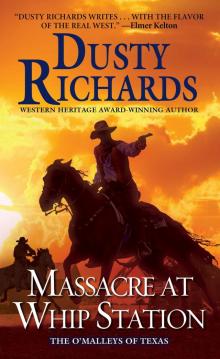 Massacre at Whip Station
Massacre at Whip Station Blue Roan Colt
Blue Roan Colt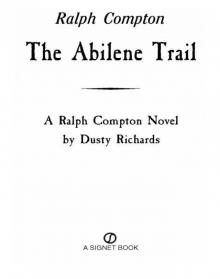 The Abilene Trail
The Abilene Trail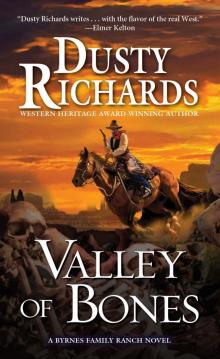 Valley of Bones
Valley of Bones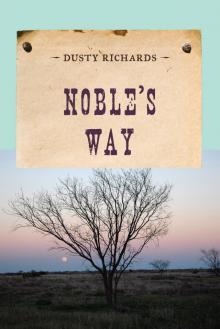 Noble's Way
Noble's Way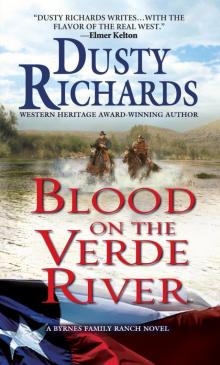 Blood on the Verde River
Blood on the Verde River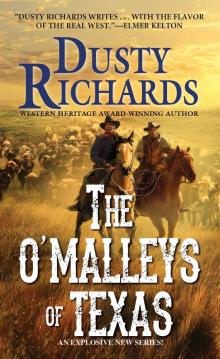 The O'Malleys of Texas
The O'Malleys of Texas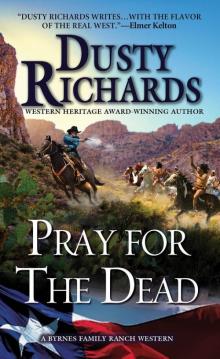 Pray for the Dead
Pray for the Dead Arizona Territory
Arizona Territory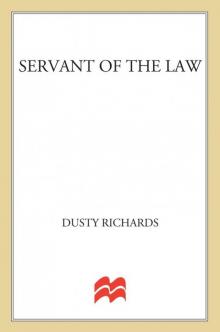 Servant of the Law
Servant of the Law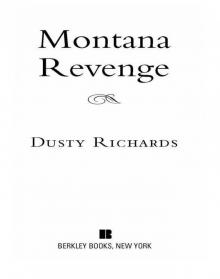 Montana Revenge
Montana Revenge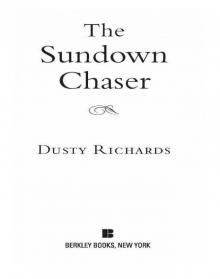 The Sundown Chaser
The Sundown Chaser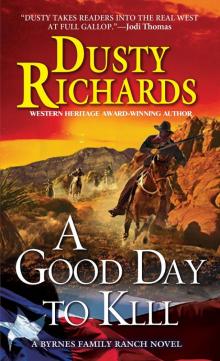 A Good Day To Kill
A Good Day To Kill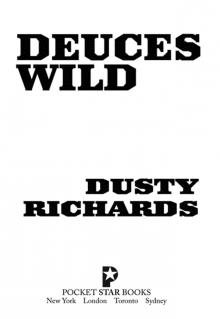 Deuces Wild
Deuces Wild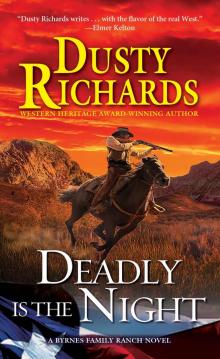 Deadly Is the Night
Deadly Is the Night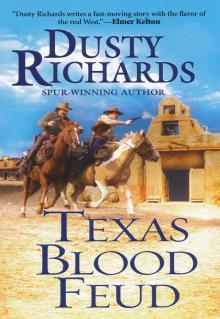 Texas Blood Feud
Texas Blood Feud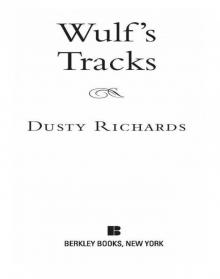 Wulf's Tracks
Wulf's Tracks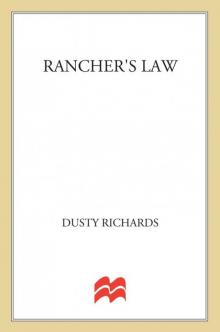 Rancher's Law
Rancher's Law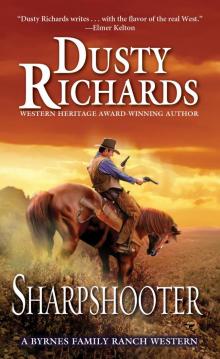 Sharpshooter
Sharpshooter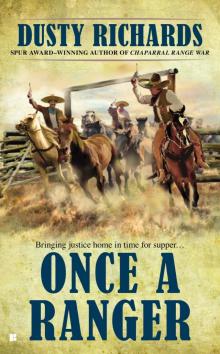 Once a Ranger
Once a Ranger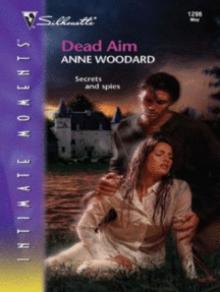 Dead Aim
Dead Aim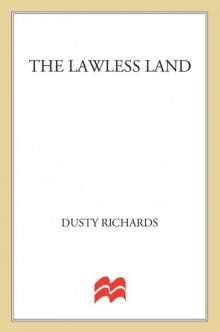 Lawless Land
Lawless Land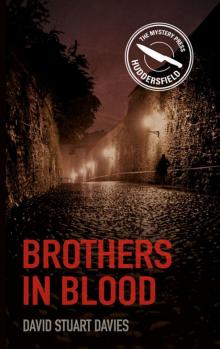 Brothers in Blood
Brothers in Blood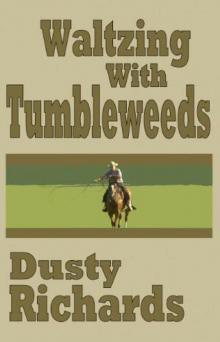 Waltzing With Tumbleweeds
Waltzing With Tumbleweeds